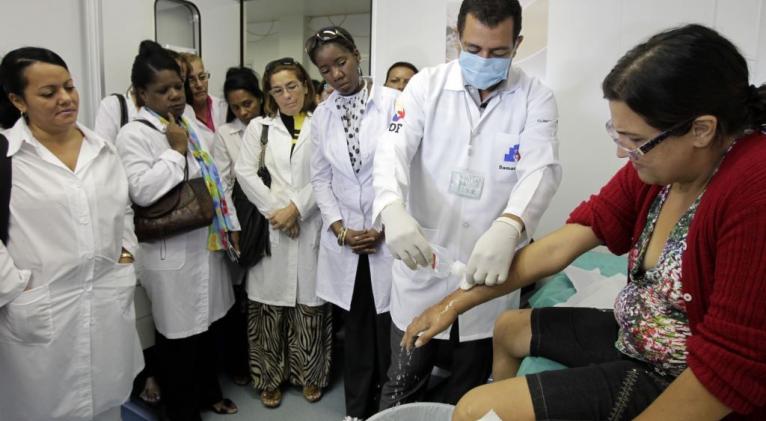Cuba's solidarity-based health care shows way forward
especiales

It is interesting that Robert Huish and David Kilcullen inhabit the same world, because their books indicate that they view the planet differently, like black and white or perhaps like life and death.
Huish stumbled across his subject matter literally by accident. He damaged himself swimming in rough seas while holidaying near Havana and was treated, for free, by the excellent Cuban medical system.
It was a revelation. In response, he set himself the research project of discovering how this tiny, economically blockaded nation could lead the world in health ― and freely export its system all over the world.
He opens his book with a short passage from Eduardo Galeano’s book of short stories The Book of Embraces, in which a doctor in a poverty-stricken rural area sets about saving a child’s life. It is a deeply moving passage.
Kilcullen, on the other hand, is part of the “military intelligentsia”. An Australian, he served as senior counterinsurgency advisor to the US-led invasions of Iraq and Afghanistan.
Having served his time in uniform, he is now CEO of Caerus Associates, a Washington-based “strategy and design firm”.
He opens his book with a Boys Own account of an attempted Afghan ambush of an armoured column of which he was part. “The gunners traversed right, angled up, then fired, each vehicle hosing the ambush down as it moved through the killing area,” he writes.
Kilcullen’s thesis is that after Afghanistan, the US and its allies will have to concentrate on suppressing urban environments.
Guerrillas will no longer hide in mountain top redoubts, they will come into the burgeoning coastal metropolises that globalisation is creating around the Third World.
He is thinking of things like the Lashkar-e-Taiba attack in Mumbai and the more recent killings in Nairobi. He specifies cities ― “urban, networked and littoral”― as the sites for his new strategy.
Kilcullen says that Western forces might get accidentally dragged into conflicts when attending to humanitarian disasters. When the US and their allies go to do nice things for people, he writes, “security might only be 10 percent of the problem, or it might be 90 percent, but whichever it is, it’s the first 10%, or the first 90 percent.”
Kilcullen seems unaware of what happened when the US unleashed the death squads in Port-au-Prince, Haiti, in 2004 in overthrowing the democratically elected president Jean-Bertrand Aristide.
With thousands being slaughtered in the slums, the Red Cross and Doctors Without Borders shut up their medical posts due to the insecurity. Yet the Cuban doctors remained, without any military protection, treating all comers, freely, with no questions asked.
Huish has delved deeply into the secret of Cuban medical internationalism, the mystery that the US just cannot seem to understand: it is in Cuba’s interests to assist other countries in overcoming structures of underdevelopment.
More than that, he says: “Cuba’s international health programs are not just symbolic; they are addressing a broad range of health calamities throughout the global south by encouraging primary care at the local level.”
Cuba has not only dispatched thousands of its medical workers to other countries, they have provided free education to people from poor communities in countries like East Timor so they can reproduce the Cuban success.
“The country is working to train more health-care workers for the global south than the world has ever seen,” Huish says.
Cuban medicine can only provide few heroic interventions using expensive equipment to cure sickness. So Cuba has perfected community medicine, doctors getting close to their communities to discern why people are getting ill and curing the diseases before they start.
Any Australian socialists who labour under the illusion that the Cuban government is Stalinist should read this book.
When Stalin (and those who inherited his system) dominated the world communist movement, there were many dedicated and idealistic revolutionaries who had mistaken faith in the USSR. They did dedicated work but at every turn they were undermined and corrupted by bureaucratism.
Cuba systematically does the opposite ― it trains medical workers in selflessness and revolutionary ideals.
Any people pursuing medical studies in Australia will enjoy Huish’s book. His description of Cuban medical training is an eye-opener. Hands-on, intensive diagnostics and treatment are at the heart of Cuban medicine.
More than that, as he saw in a Cuban hospital, “no-one was alone ― no patient was ignored or forgotten”. Cuba trains doctors to sit with patients for hours, getting to know them and understand what has made them ill.
Outside of Cuba, when Huish travelled to Uruguay, he found many back-handed compliments to Cuban medicine. For example, he encountered a private, profit-making medical centre that included the word “Cuba” in its name because of the widespread recognition of the quality of Cuban medicine.
We live in dark and perilous times, capitalism is threatening the whole planet and we all must take sides. While Kilcullen is steering the wheels of the US battle wagon towards its next “killing zone”, Cuba offers the opposite choice.
Against the menace of capitalism, Cuba shows the promise of socialism.













Add new comment